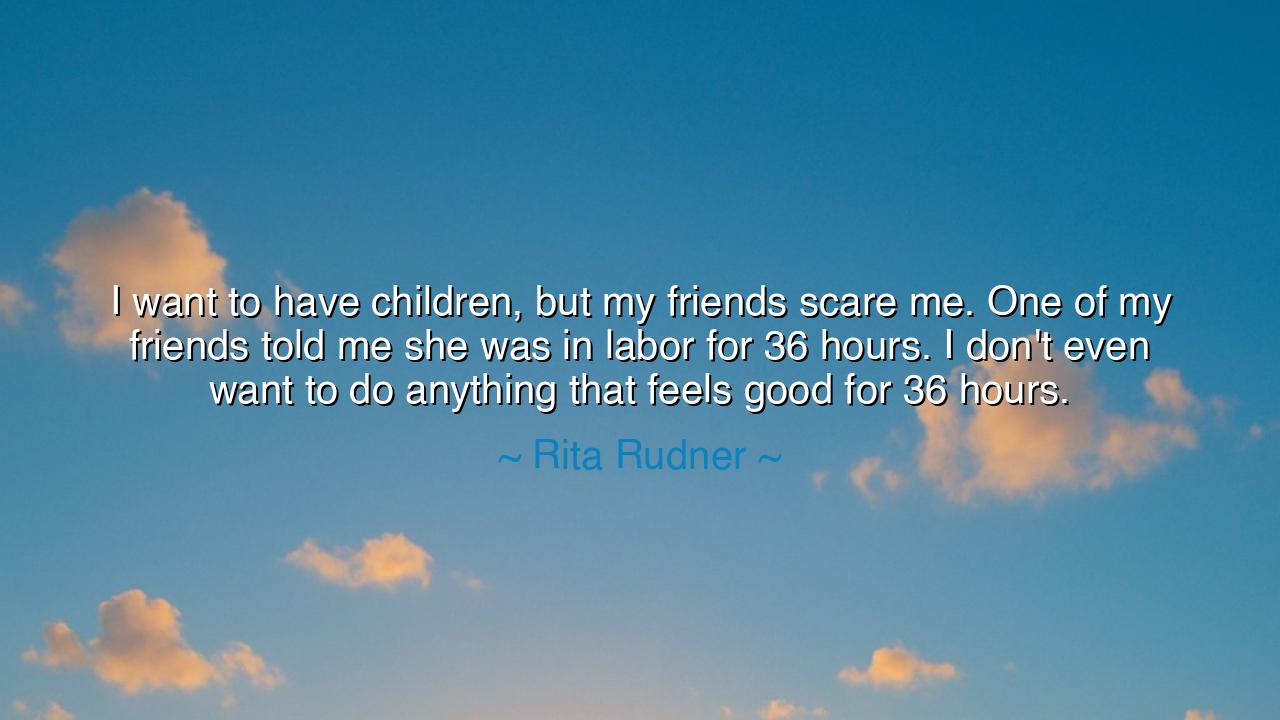
I want to have children, but my friends scare me. One of my
I want to have children, but my friends scare me. One of my friends told me she was in labor for 36 hours. I don't even want to do anything that feels good for 36 hours.






The words of Rita Rudner—“I want to have children, but my friends scare me. One of my friends told me she was in labor for 36 hours. I don't even want to do anything that feels good for 36 hours.”—are wrapped in humor, yet beneath their laughter lies a profound truth about the fear, awe, and sacrifice that surround the mystery of childbirth. She speaks to the natural hesitation of the human heart before the gates of suffering, and to the paradox that what brings forth life often demands struggle beyond imagination. Her jest points to a deeper wisdom: that the path to parenthood is both terrifying and glorious, marked by endurance few would willingly seek, yet crowned with rewards beyond measure.
The ancients knew well that birth was not merely a natural act, but a sacred ordeal. In the temples of old, mothers were honored as warriors, for they faced a trial greater than battle: to walk through hours, even days, of pain in order to usher new life into the world. The Greeks praised the goddess Eileithyia, who governed the pangs of childbirth; the Romans honored Lucina as the one who “brought to light” the hidden child. In these myths, we see acknowledgment of the truth Rudner jokes about: that labor is not only long, but overwhelming, a test of human strength that few other experiences can match.
History is filled with accounts of this endurance. Consider Catherine de’ Medici, queen of France, who bore ten children. Records tell of her suffering through excruciating hours of labor, her body strained yet her duty unshaken, for each child was not only a life but also a political promise. Her labors were not of hours only, but of destiny. Though Rudner’s humor makes light of the length, history reminds us of the weight of such time: thirty-six hours not simply of waiting, but of agony, courage, and the heroic patience of mothers.
The meaning of Rudner’s words also lies in the tension between desire and fear. She wants children, but she is frightened. This is the eternal paradox of parenthood: the longing for new life, shadowed by the dread of what must be endured to gain it. Her jest about avoiding even pleasure for so long is a reminder that human beings often shrink before hardship, even as they yearn for its rewards. It is easier to imagine delight without cost than to accept joy born of trial. Yet in truth, the greatest treasures of life often demand endurance—whether in childbirth, in art, in labor, or in love.
What Rudner names in jest is, in reality, a universal truth: creation requires pain. The mother’s thirty-six hours of labor are but one reflection of a deeper pattern—the sculptor chipping stone for years to reveal beauty, the soldier enduring long marches before victory, the parent sacrificing time and comfort to raise a child. The endurance itself is not pleasant, but it makes the fruit of the labor sacred. Were it easy, it would not carry the same weight, nor inspire the same gratitude.
The lesson is this: do not fear the trial, but honor it. It is natural to feel overwhelmed at the thought of long hours of struggle. Yet remember that such struggles are the crucibles where love and strength are forged. Just as the mother emerges with a child, so too do we emerge with wisdom, resilience, and joy from the hardships we dare to face. Rudner’s jest points to a deeper challenge: to accept that what is most precious will never be gained without cost.
Therefore, let your actions be these: approach hardship with courage, even when it seems unbearable. Laugh at your fears, as Rudner does, but do not let laughter become avoidance. Instead, let humor lighten the burden while you walk through the trial. Honor the mothers who have endured such labors, and honor yourself when you face your own. For thirty-six hours of pain, or thirty-six years of effort, may give rise to blessings that last for generations.
Thus, Rita Rudner’s words, though spoken in jest, carry a timeless truth: that the path to life and love is paved with endurance, and that even fear itself can be met with humor, courage, and hope. Let this be remembered: though the trial is long, the gift it brings is eternal.






AAdministratorAdministrator
Welcome, honored guests. Please leave a comment, we will respond soon